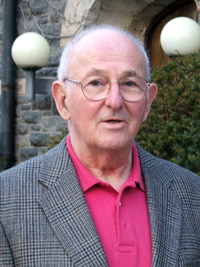RIP Jacob Neusner (1932–2016)

Jacob Neusner (1932-2016), one of the world’s premier scholars of Jewish rabbinical texts, died earlier this month, on October 8, 2016. Neusner was the author or editor of more than 900 books for students, scholars, and general readers in Judaism, comparative religion, and the history and analysis of rabbinic texts, including the landmark, 35-volume The Talmud of the Land of Israel, published by the University of Chicago Press. Among those institutions he taught at during his distinguished academic career were Dartmouth College, Brown University, the University of South Florida, and Bard College. Below follow some remembrances of Nesuner’s life and works.
From Aaron Hughes for the American Academy of Religion:
Jacob Neusner was born to Samuel and Lee Neusner on July 12, 1932, in West Hartford, Connecticut. His father owned the Connecticut Jewish Ledger, a Jewish weekly that continues to serve the Connecticut region and western Massachusetts. The young Neusner received his first typewriter at age twelve and, by his junior year in high school, could do all the jobs associated with a newspaper. From a young age he could write both quickly and to make deadlines. Neusner grew up attending public school as opposed to Jewish day school, and his values largely reflected those of other assimilated and suburban Jews who came of age in 1940s and 1950s America. But whereas many of them ended up in law or medical school, Neusner realized, from a young age, that he wanted to be a rabbi—though he admitted later to me that he had no idea at the time what that meant, I suspect it was to lead a life immersed in the Jewish texts that he had yet to encounter.
Neusner had no formal education in Judaism and only a rudimentary knowledge of the Hebrew alphabet. All of this would work to his advantage. Because he was not from the “old world” and because he lacked a traditional yeshiva or seminary education, he was neither limited by tradition nor aware of his own shortcomings. Neusner, instead, represented a new paradigm: a suburban Jew, a second generation American, with no formal Jewish education outside of Reform Sunday school, and someone who could barely read a line of Hebrew. Only such an individual, as paradoxical as it may sound, could propose a new model for examining the sacred texts of Judaism by integrating them into the academic study of religion.
From Alan J. Avery-Peck for Forward:
Through critical examination, massive projects of translation and commentary, and his application of disciplines ranging from literary study to anthropology, Neusner brought the study of Judaism — and the university-trained scholar of Judaism — into dialogue with scholarship throughout the academy. Talmudic literature, previously viewed as neither accessible nor, because of its superficially arcane content, as worth accessing, would now contribute to the work of humanists and social scientists throughout the academy.
This had another important implication. Even as Jews and Judaism came of age and became increasingly at home in the America of the 1960s and beyond, Jacob Neusner assured that Jewish history, literature and tradition would take their rightful place within the academy, benefiting from critical study while also demonstrating how Jews and their literary and intellectual legacy contribute to human learning overall.
In this work, Neusner defied entrenched religious and academic monopolies, whose approach to these texts and commitment to a traditional reading of Jewish history and religion was now challenged exactly as, a century before, academic study had challenged regnant, fundamentalist readings of the Hebrew Bible. Strikingly, today, just as a critical approach to the Hebrew Bible has begun to enter even the world of Jewish Orthodoxy, Neusner’s critical methodology is standard, even among scholars who no longer are conscious of where these approaches came from and who take issue with Neusner’s specific conclusions.
Whether he wins or loses on the details, Neusner won the battle over how Talmudic texts would be studied and how they would be regarded in the contemporary academy.
To read more about Neusner’s works published by the University of Chicago Press, click here.